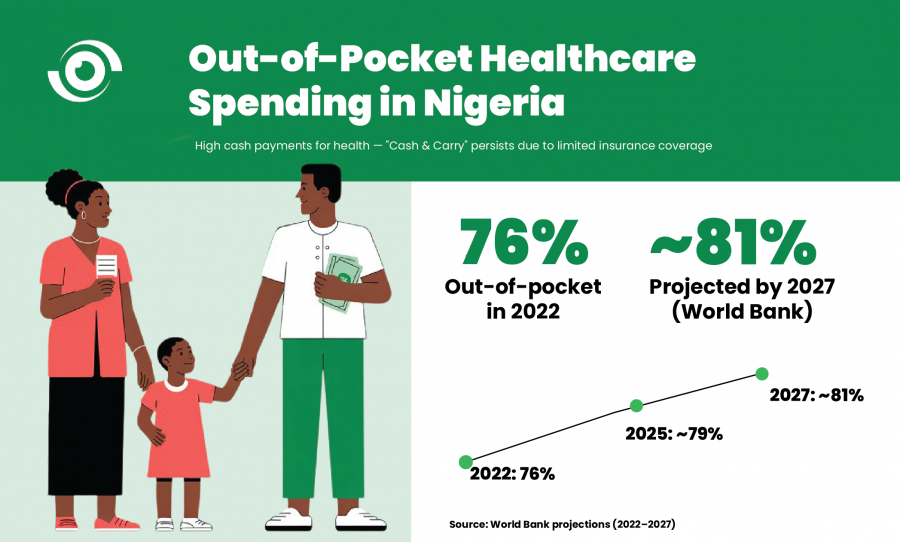Yasir Jamal Bakare and Ibukun Oguntola (Lead writers)
President Bola Ahmed Tinubu’s directive mandating all Ministries, Departments, and Agencies (MDAs) to enrol their employees under the National Health Insurance Authority (NHIA) marks a significant policy inflection point in Nigeria’s universal health coverage (UHC) journey. It moves health insurance from the realm of voluntary uptake into the domain of regulatory compliance.
Nigeria’s low insurance penetration, covering fewer than 10% of its population, has long been an obstacle to financial protection in health. Out-of-pocket payments still account for more than 70% of total health expenditure, according to World Bank data.

The NHIA Act of 2022 sought to reverse this trend by making health insurance mandatory, creating a vulnerable group fund (VGF) to subsidise the poor, and tying coverage to employer obligations. Yet, while the law provided a framework, implementation lagged. Now, this order seeks to change that.
The five orders that change the game
The President’s directive rests on five pillars that together transform how health insurance will be embedded in Nigeria’s governance systems.
- First, all MDAs must ensure that their staff are enrolled in the NHIA scheme, signalling that the public sector should lead by example, and may take up supplementary private insurance coverage in accordance with the NHIA Act.
- The directive goes further by making health insurance a prerequisite for procurement, meaning that no company will be eligible to bid for government contracts, without presenting a valid NHIA Health Insurance Certificate.
- Licenses and permits will also be tied to compliance, with organisations required to show proof of valid coverage before they can receive or renew official approvals.
- To support these measures, the NHIA has been tasked with developing a digital verification platform that will allow certificates to be authenticated in real time. As stated by the Director-General of the National Health Insurance Agency, Dr Kelechi Ohiri during the recently concluded National Health Financing Policy Dialogue in Abuja, themed “Reimagining the Future of Health Financing in Nigeria.” This step is crucial in reducing fraud and providing policymakers and partners with reliable data.
- Finally, every MDA is expected to put in place its own internal mechanisms for monitoring compliance, ensuring that the directive is not only announced, but also sustained.
Why this matters
The significance of these measures cannot be overstated. For years, health insurance reforms in Nigeria have faltered because policies lacked enforcement. By linking health coverage to core government functions such as employment, procurement, and licensing, the state has shifted insurance from being aspirational to being a practical necessity.
The move builds credibility for a system that has often struggled to win trust. Nigerians, long neglected in consistent enrolment, will now be covered, creating confidence before demands are extended to the private sector. Businesses engaging with government will be compelled to join the insurance system, expanding the pool of insured Nigerians, and most importantly, the introduction of digital verification promises transparency and accountability that have historically been absent.
Future directions and areas to navigate
These strides forward, however could face real hurdles. At the administrative level, there is a need for an independent body to ensure enforcement functions, as most MDAs were not structured to take on this role. Nigeria’s digital infrastructure and public sector e-governance tools remain uneven, echoing challenges identified in broader e-service implementation studies, which highlight gaps in local-level service integration and system readiness.
In addition, Nigeria’s health insurance scheme has historically struggled with structural issues such as inequitable resource distribution, decaying healthcare infrastructure, and weak human resource management systems, all of which have impeded the expansion and quality of coverage. Even the improved NHIA Act contends with the large informal sector and low adoption rates among informal workers, coverage among whom is recorded at just 3.4%.
Furthermore, achieving equitable access requires that the VGF created under Part III, Section 25 of the NHIA Act must be fully activated and transparently managed to ensure that the scheme does not exclude the poorest. Without equitable financing mechanisms in place, mandates risk reinforcing inequalities rather than alleviating them.
The mindset shift Nigeria needs
Nigeria now has all three elements: a legal mandate through the NHIA Act, the VGF to provide equity, and a digital verification system to enable enforcement. The onus is on execution.
President Tinubu’s order is bold, but boldness alone will not deliver results. Implementation will require discipline, coordination, and vigilance. MDAs must embed compliance, NHIA must deliver a functional verification platform, and government must finance and protect the VGF.
For policymakers, donors, health institutions, and private sector actors, this is a moment to align, collaborate, and demand transparency. If faithfully implemented, this directive could mark the turning point where Nigerians begin to break free from the out-of-pocket trap and taking decisive steps toward universal health coverage.